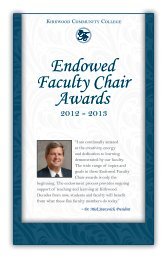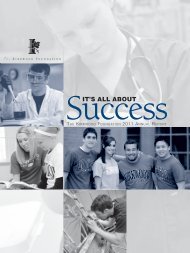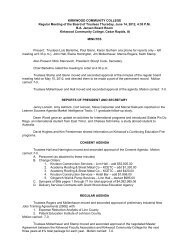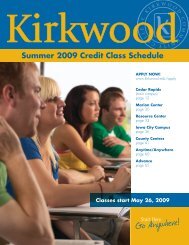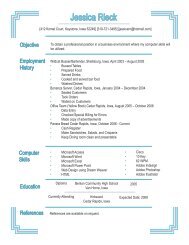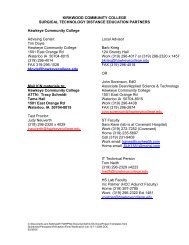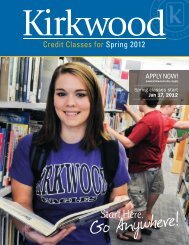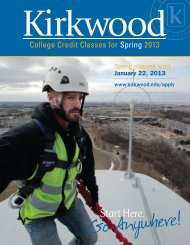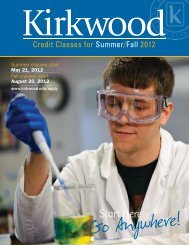Summer/Fall 2011 Credit Class Schedule - Kirkwood Community ...
Summer/Fall 2011 Credit Class Schedule - Kirkwood Community ...
Summer/Fall 2011 Credit Class Schedule - Kirkwood Community ...
You also want an ePaper? Increase the reach of your titles
YUMPU automatically turns print PDFs into web optimized ePapers that Google loves.
Applied Violin 1–2<br />
> MUA-318<br />
Requires 14 lessons during the semester.<br />
Students may enroll in one or two credit hours<br />
on the same instrument. One 25-minute lesson<br />
per week is one credit; one 50-minute lesson<br />
per week is two credits. May be repeated for<br />
credit. Additional outside practice/preparation<br />
is required.<br />
(0/2-4/0/0); ASE Code: A<br />
Applied Voice 1–2<br />
> MUA-319<br />
Requires 14 lessons during the semester.<br />
Students may enroll in one or two credit hours<br />
on the same instrument. One 25-minute lesson<br />
per week is one credit; one 50-minute lesson<br />
per week is two credits. May be repeated for<br />
credit. Add. outside practice/prep. is required.<br />
(0/2-4/0/0); ASE Code: A<br />
MUS<br />
MUSIC - GENERAL<br />
Music Appreciation 3<br />
> MUS-100<br />
Includes study of elements and forms of music<br />
with attention to major historical periods and<br />
composers of historical significance and<br />
survey of indigenous music.<br />
(3/0/0/0); ASE Code: A<br />
Music Fundamentals 3<br />
> MUS-102<br />
Introduces music majors and nonmajors to the<br />
principal elements of music theory including<br />
notation, melody, choral harmony and musical<br />
form. Intended for students with strong interest<br />
but limited background in music theory.<br />
(3/0/0/0); ASE Code: A<br />
Music Theory I 3<br />
> MUS-120<br />
Studies the notation of pitch and rhythm,<br />
meter, major and minor key relationships,<br />
melodic structure, intervals, triads, two-part<br />
counterpoint, the basics of four-part harmony<br />
and instrument transposition.<br />
(3/0/0/0); ASE Code: A<br />
Music Theory Lab I 1<br />
> MUS-135<br />
Supports the objectives in MUS-120 by<br />
developing skills in ear training (aural<br />
identification of scales, intervals and chords),<br />
dictation (rhythmic, melodic and harmonic),<br />
and sight singing.<br />
(0/2/0/0); ASE Code: A<br />
<strong>Kirkwood</strong> <strong>Credit</strong> <strong>Class</strong> <strong>Schedule</strong> . summer & <strong>Fall</strong> <strong>2011</strong> . COURSE DESCRIPTIONS<br />
Concert Choir 1<br />
> MUS-140<br />
Serves students with ability and desire to sing<br />
in a mixed-voice group. May be repeated for<br />
credit.<br />
(0/0/3/0); ASE Code: A<br />
Concert Band 1<br />
> MUS-145<br />
Introduces new literature each semester to<br />
extend the experience of the student’s learning<br />
to read and play different styles and tempos.<br />
This group is open to community members<br />
and does not require an audition.<br />
(0/2/0/0); ASE Code: A<br />
Chamber Ensemble 1<br />
> MUS-150<br />
Students practice and perform traditional<br />
literature for trios, quartets and other small<br />
groups.<br />
(0/2/0/0); ASE Code: A<br />
Vocal Jazz Ensemble 1<br />
> MUS-157<br />
Provides auditioned members an opportunity<br />
to sing a variety of jazz styles from traditional to<br />
contemporary arrangements. May be repeated<br />
for credit.<br />
(0/5/0/0); ASE Code: A<br />
Instrumental Jazz Ensemble 1<br />
> MUS-163<br />
Explores various styles of jazz from traditional<br />
to contemporary through a performanceoriented<br />
class. May be repeated for credit.<br />
(0/0/0/4); ASE Code: A<br />
Jazz Combo 1–2<br />
> MUS-165<br />
Explores various styles of jazz in a small group<br />
setting and emphasizes improvisational<br />
techniques. This course must be taken for a<br />
grade, may not be challenged and is<br />
transferable.<br />
(0/2-4/0/0); ASE Code: A<br />
Jazz Improvisation 2<br />
> MUS-191<br />
Studies theoretical principles and techniques<br />
used in the jazz idiom. Provides opportunity for<br />
application of music theory at the performance<br />
level to include scales, chord progressions,<br />
melodic patterns and rhythmic elements.<br />
Recommended for both instrumentalists and<br />
vocalists.<br />
(2/0/0/0); ASE Code: A<br />
Rock, Jazz and Blues Music 3<br />
> MUS-208<br />
Explores American rock, jazz and blues music<br />
in the 20th century. Emphasis on major<br />
composers, bands and performers 1900 –<br />
present. Examines American popular music<br />
trends and styles through lecture, discussion<br />
and listening.<br />
(3/0/0/0); ASE Code: A<br />
Music Theory III 3<br />
> MUS-220<br />
Studies plainchant and modal theory; early<br />
polyphony in 2, 3 and 4 voices; inventions and<br />
fugues; borrowed, Neapolitan and augmented<br />
sixth harmonies; harmonic and melodic<br />
variations; sonata form and rondo form.<br />
Examines and analyzes music from the<br />
medieval period through the early Romantic<br />
era.<br />
(3/0/0/0); ASE Code: A; Prereq: MUS-121<br />
Music Theory Lab III 1<br />
> MUS-235<br />
Supports the objectives in MUS-220 by<br />
developing advanced skills in ear training<br />
(aural identification of scales, intervals and<br />
chords), dictation (rhythmic, melodic and<br />
harmonic) and sight singing.<br />
(0/2/0/0); ASE Code: A; Prereq: MUS-136<br />
Intro to MIDI<br />
> MUS-259<br />
3<br />
Presents an overview of and practical<br />
experience music-related hardware and<br />
software products. Introduces Musical<br />
Instrument Digital Interface (MIDI), along with<br />
digital audio and its application to composition,<br />
orchestration, recording, performance and<br />
education. Includes drum programming, plugins,<br />
loops, soft synths, instrument patch maps,<br />
MIDI/Audio editing and file conversion.<br />
Emphasizes sequencing software and<br />
synthesizers to produce music projects.<br />
(3/0/0/0); ASE Code: A<br />
Note: Knowledge of basic music fundamentals<br />
required.<br />
Audio Production I 3<br />
> MUS-268<br />
Studies the history, theory and techniques of<br />
audio production. Focuses on the fundamentals<br />
of sound: what it is, how it is created and how<br />
we perceive it. Studies capturing, editing,<br />
mixing and mastering audio using a variety of<br />
analog and digital equipment, and computer<br />
software such as Pro Tools, Logic Pro, Sonar<br />
and SAW.<br />
(3/0/0/0); ASE Code: A<br />
register online > eaglenet.kirkwood.edu <strong>Summer</strong> & <strong>Fall</strong> <strong>2011</strong> . <strong>Kirkwood</strong> <strong>Community</strong> College 103<br />
Course Descriptions



